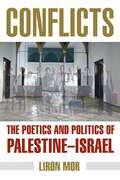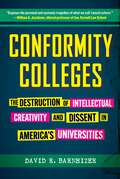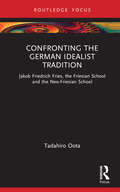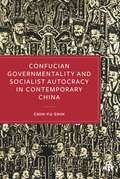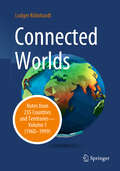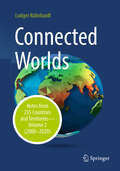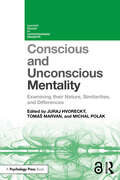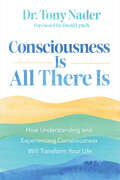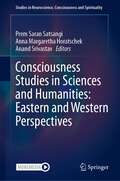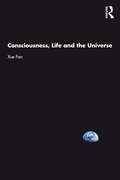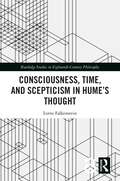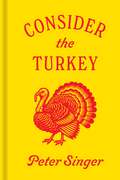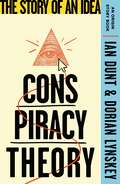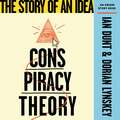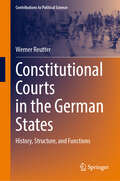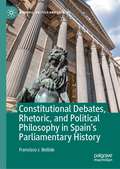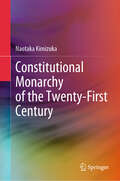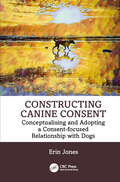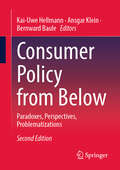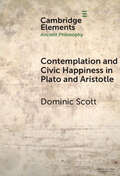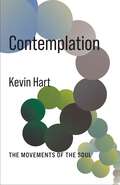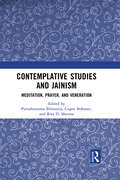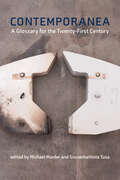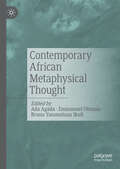- Table View
- List View
Conflicts: The Poetics and Politics of Palestine-Israel
by Liron MorLiron Mor’s book queries what conflict means in the context of Palestine–Israel. Conflict has long been seen as singular and primary: as an “original sin” that necessitates the state and underwrites politics. This book problematizes this universal notion of conflict, revealing its colonial implications and proposing that conflicts are always politically constructed after the fact and are thus to be understood in their various specific forms. The book explores sites of poetic and political strife in Palestine–Israel by combining a comparative study of Hebrew and Arabic literature with political and literary theory. Mor leverages an archive that ranges from the 1930s to the present, from prose and poetry to film and television, to challenge the conception of the Palestinian–Israeli context as a conflict, delineating the colonial history of this concept and showing its inadequacy to Palestine–Israel. Instead, Mor articulates locally specific modes of theorizing the antagonisms and mediations, colonial technologies, and anticolonial practices that make up the fabric of this site. The book thus offers five figurative conflictual concepts that are derived from the poetics of the works: conflict (judgment/ishtibāk), levaṭim (disorienting dilemmas), ikhtifāʾ (anti/colonial disappearance), ḥoḳ (mediating law), and inqisām (hostile severance). In so doing, Conflicts aims to generate a historically and geographically situated mode of theory-making, which defies the separation between the conceptual and the poetic.
Conformity Colleges: The Destruction of Intellectual Creativity and Dissent in America's Universities
by David R. BarnhizerThe United States' education system, especially its universities, is under attack by the ideological Left, dominated by advocates of Wokeism and Critical Race Theory. Marshall McLuhan was a brilliant thinker best known for his insight that &“the medium is the message." Universities, as well as our entire educational &“medium&” including the K-12 system that feeds its graduates into the university and societal systems, are powerful and overarching mechanisms that we use to shape our understanding. For Western nations, the ideal of the university and of education generally has been to provide us with analytical skills, knowledge, and the ability to create and nurture a healthy society that benefits as many people as possible. That ideal, and the university as educational and social &“medium,&” is under severe attack. The power to use the university as an overarching &“medium&” that offers a strong sense of legitimacy to even flawed and overstated arguments and assertions is why the institution is a target of an ideological Left that is now dominated by advocates of Wokeism and Critical Race Theory. Once obtaining a strong power base in university disciplines and administrations, the revolutionaries of race, gender, and other radical interests metamorphosed from heroic moral beacons fighting and railing against injustice, and revealed themselves as ideological dictators. The truth is that what we now refer to as the Woke/Critical Race Theory activist movement—particularly that controlled by those who came to power in the past thirty years or so—were not simply seeking to expand the nature and content of the university curriculum, or even what is taught in the K-12 system. Their intent was and is to &“destabilize,&” &“transform,&” and supplant what is taught. They seek to create a culture that elevates their interests while aggressively repressing anything they see as an obstacle to power, including healthy discourse and debate. The activists of the Woke/Critical Race Theory Movement are not an honest intellectual movement. They are intense and aggressive political strategists, self-styled &“revolutionaries&” seeking to use our educational systems with the framed narrative of Diversity, Equity, and Inclusion (DEI) that is actually one of "Division, Enmity, and Intimidation/Indoctrination," all the while claiming their interests are benign and aimed at healing. In reality, they are fracturing our fundamental social order, sowing discord, and deliberately suppressing the freedom of speech and thought essential to the well-being of our democratic republic. Conformity Colleges: The Destruction of Intellectual Creativity and Dissent in America&’s Universities will help you understand what is happening and come to grips with the need to challenge, counter, and reverse this &“revolution." Nothing of significance can be done to stop what is going on unless the DEI administrative bureaucracy that now controls universities is dismantled or substantially weakened.
Confronting the German Idealist Tradition: Jakob Friedrich Fries, the Friesian School and the Neo-Friesian School
by Tadahiro OotaThe philosophical activity of modern Germany represents a peak in the history of philosophy beginning from Thales in ancient Greece. This book attempts to reconsider the conventional image of 19th-century German philosophy. To this end, it illuminates a forgotten philosophical stream contemporaneous with so-called "German idealism." From this perspective, this book examines the philosophy of Jakob Friedrich Fries, a philosopher contemporaneous and in confrontation with Hegel. By examining Fries’ standpoint, the book attempts to reconstruct the picture of 19th-century German philosophy. In the 19th and 20th centuries, philosophers other than Kant, Fichte, Schelling, and Hegel – especially Fries – had a significant influence on the history of philosophy, constituting an alternative genealogy to Hegel’s. One might say that the conventional history of philosophy conceals Fries’ influence. Accordingly, this book will examine Fries’ philosophy, the Friesian school established by E.F. Apelt, and the Neo-Friesian school formed by Leonard Nelson. This approach reveals the factiousness of the history of philosophy that starts from Kant, passes through German idealism and flows into the Neo-Kantian movement. It will provide a new viewpoint from which to reconsider the history of German philosophy.
Confucian Governmentality and Socialist Autocracy in Contemporary China
by Chih-yu ShihIn October 2022, the 20th Party Congress of the Chinese Communist Party (CCP) concluded, extending Xi Jinping's leadership indefinitely, which many view as a one-party dictatorship. Exploring Confucian and socialist principles, this book examines the relationship between the citizens and leaders in the Chinese autocracy. By applying a Foucauldian twist to a range of topics – from discussing the politics of love and pandemic nationalism to analysing Xi’s personality – it challenges the binary of authoritarianism and democracy. Interdisciplinary in nature, it will appeal to scholars and students working in the fields of politics, international relations, culture studies and critical theory.
Connected Worlds: Notes from 235 Countries and Territories - Volume 1 (1960-1999)
by Ludger KühnhardtThe notes that Ludger Kühnhardt wrote in 235 countries and territories around the world create a fascinating panorama, reflected in the personal impressions, encounters and experiences of a political scientist and journalist working all over the world. The book reconstructs the connections between Europe's transformations and the emerging global era over six decades from 1960 to the threshold of the post-Corona world of 2020.
Connected Worlds: Notes from 235 Countries and Territories - Volume 2 (2000-2020)
by Ludger KühnhardtThe diary notes that Ludger Kühnhardt took while visiting or staying in 235 countries and territories around the world create a fascinating panorama, reflected in the personal impressions, encounters and experiences of a political scientist and journalist working all over the world. The book reconstructs the connections between Europe's transformations and the emerging global era over six decades from 1960 to the threshold of the post-Corona world of 2020.
Conscious and Unconscious Mentality: Examining their Nature, Similarities, and Differences (Current Issues in Consciousness Research)
by Juraj HvoreckýIn this collection of essays, experts in the field of consciousness research shed light on the intricate relationship between conscious and unconscious states of mind. Advancing the debate on consciousness research, this book puts centre stage the topic of commonalities and differences between conscious and unconscious contents of the mind. The collection of cutting-edge chapters offers a breadth of research perspectives, with some arguing that unconscious states have been unjustly overlooked and deserve recognition for their richness and wide scope. Others contend that significant differences between conscious and unconscious states persist, highlighting the importance of their distinct characteristics. Explorations into the nature of the transition from unconscious to conscious mind further complicate the picture, with some authors questioning whether a sharp divide between unconscious and conscious states truly exists. Delving into ontological, epistemological, and methodological issues, this thought-provoking text challenges established paradigms and paves the way for a reimagining of consciousness research. It does so in an understandable and accessible way, making this a perfect companion for both experts and students of philosophy, psychology, and related fields. Chapters 2, 4, 9, 10, 14 and 16 of this book are freely available as downloadable Open Access PDFs at http://www.taylorfrancis.com under a Creative Commons Attribution-Non Commercial-No Derivatives (CC-BY-NC-ND) 4.0 license.
Consciousness Is All There Is: How Understanding and Experiencing Consciousness Will Transform Your Life
by Dr. Tony NaderNEW YORK TIMES AND USA TODAY BESTSELLERFrom a renowned Vedic scholar, leader of the Maharishi Foundations, and Harvard-trained neuroscientist: a radical new paradigm for understanding Consciousness and finding enlightenment, peace, and fulfillmentDr. Tony Nader, a renowned Vedic scholar and neuroscientist, offers a direct path to peace for ourselves and our world that anyone can obtain—simply by delving into our own Consciousness. Dr. Nader provides the methods, tools, and guidance for connecting with our authentic inner nature and understanding how Consciousness is the essence of all existence, including addressing such fundamental questions as:What is the key to a well-lived, flourishing life in which we can all coexist in peace? Can freedom be compatible with law and order?How can we meet all our challenges as individuals and a society, including the environment, genetic engineering, and the rapid development of artificial intelligence?True wellness is a state of profound clarity, peace, and contentment, resulting from connection with our pure Consciousness. By enlivening our coherence between our Consciousness and the external world, we can find our happiest and highest states of ourselves."Consciousness Is All There Is will open doors of perception for you to a new and profound understanding of life."— Marci Shimoff, #1 New York Times best-selling author of Chicken Soup for the Woman's Soul and Happy for No Reason
Consciousness Studies in Sciences and Humanities: Eastern and Western Perspectives (Studies in Neuroscience, Consciousness and Spirituality #8)
by Anand Srivastav Prem Saran Satsangi Anna Margaretha HoratschekThis book presents consciousness models from Eastern and Western perspectives that accommodate current scientific research in the natural sciences and humanities, from neurological experiments through philosophical enquiries to spiritual approaches. It offers up to date research from key disciplines in consciousness studies ranging from neurology, quantum mechanics, algorithmic science, mathematics, and astrophysics to literary studies, philosophy, and (comparative) theology. The volume examines the dichotomy between Western and Eastern perceptions of consciousness – where consciousness is perceived as brain activity by Western scientists, and as a divine presence by various religions, especially in the East. The essays contextualize each other and reciprocally illuminate the potential and limits of the respective approaches. The texts aim at a transdisciplinary and transcultural exchange of ideas in consciousness studies and address a readership from interested lay-readers to experts of the field. The volume is of interest to researchers of consciousness studies.
Consciousness, Life and the Universe
by Xue FanWhat is consciousness? What is life? What is the universe? This book explores these three interconnected questions, providing deep insights into the past, present and future of consciousness research. Consciousness, Life and the Universe builds a unified view of consciousness across biological, chemical and physical scales, tracing the natural connections from the infinitesimally small to the infinitely big; from quantum fields and elementary particles to molecules, cells and living organisms to the cosmos; from the evolution of life to the evolution of the universe and to the future of humanity. The book provides a unified framework for future consciousness studies and identifies the scientific and technological approaches that are essential for further understanding consciousness. Through this pioneering research approach, the book clearly redefines consciousness and life and conceives a plausible view of the origin and nature of the universe. This is a must-read for students and researchers in consciousness studies, cognitive psychology, cognitive science and neuroscience, as well as anyone interested in the biological and physical basis of consciousness and the history and evolution of consciousness research.
Consciousness, Time, and Scepticism in Hume’s Thought (Routledge Studies in Eighteenth-Century Philosophy)
by Lorne FalkensteinDavid Hume’s philosophical work presents the reader with a perplexing mix of constructive accounts of empirically guided belief and destructive sceptical arguments against all belief. This book reconciles this conflict by showing that Hume intended his scepticism to be remedial. It immunizes us against the influence of “unphilosophical” causes of belief, determining us to proportion our beliefs to the evidence.In making this case, this book develops Humean positions on topics Hume did not discuss in detail but that are of interest to contemporary philosophers: consciousness and the unity of consciousness, temporal experience, visual spatial perception, the experience of colour and other qualia, objective experience, and spatially extended minds. It also challenges currently accepted interpretations of Hume’s views on the finite divisibility of space and time, vacuum, the duration of unchanging objects, and identity over time. It deals with criticisms of Hume that were raised by his contemporaries, notably by Thomas Reid, draws attention to earlier seventeenth‑ and eighteenth‑century work that has bearing on the interpretation of Hume’s thought, and compares Hume’s achievements with those of later nineteenth‑century psychologists and philosophers.Consciousness, Time, and Scepticism in Hume’s Thought will appeal to scholars and advanced students interested in Hume, history of philosophy, and early modern theories of perception, time, and consciousness.
Consider the Turkey
by Peter SingerWhy this holiday season is a great time to rethink the traditional turkey feastA turkey is the centerpiece of countless Thanksgiving and Christmas dinners. Yet most of us know almost nothing about today&’s specially bred, commercially produced birds. In this brief book, bestselling author Peter Singer tells their story—and, unfortunately, it&’s not a happy one. Along the way, he also offers a brief history of the turkey and its consumption, ridicules the annual U.S. presidential &“pardon&” of a Thanksgiving turkey, and introduces us to &“a tremendously handsome, outgoing, and intelligent turkey&” named Cornelius. Above all, Singer explains how we can improve our holiday tables—for turkeys, people, and the planet—by liberating ourselves from the traditional turkey feast. In its place, he encourages us to consider trying a vegetarian alternative—or just serving the side dishes that many people already enjoy far more than turkey. Complete with some delicious recipes for turkey-free holiday feasting, Consider the Turkey will make you reconsider what you serve for your next holiday meal—or even tomorrow&’s dinner.
Conspiracy Theory: The Story of an Idea (An Origin Story Book) (An Origin Story Book)
by Dorian Lynskey Ian DuntAN ORIGIN STORY BOOK'Provides clarity, scholarship, wit and essential insight into why our world is the way it is' Adam Rutherford'I wish I could make Ian and Dorian's work mandatory' Sathnam SangheraWhat makes people believe in conspiracy theories? Why have they taken over our political sphere? And how do we counter them before it's too late?The world has always had conspiracy theories. From the Illuminati to the deep state, the JFK assassination to the death of Princess Diana - there have always been those who believe that events are manipulated by shadowy forces with sinister intent. But in recent years, conspiracism has colonised the mainstream. These days, it is a booming industry, a political strategy and a pseudo-religion - and it's threatening the foundations of liberal democracy.Where once political battles were fought over ideas and values, it now feels as though we're arguing over the nature of reality itself. The problem is bigger than lizard people or UFOs: left unchecked, conspiracy theories have the power to warp the fabric of society and justify unspeakable crimes.In Conspiracy Theory: The Story of an Idea, Ian Dunt and Dorian Lynskey pull back the curtain on conspiracy theories: where they come from, who promotes them, how they work and what they're doing to us. From biblical myth to online hysteria, this book explains what happens when the human gift for storytelling goes wrong - and how we might restore our common reality.
Conspiracy Theory: The Story of an Idea (An Origin Story Book) (An Origin Story Book)
by Dorian Lynskey Ian DuntAN ORIGIN STORY BOOK'Provides clarity, scholarship, wit and essential insight into why our world is the way it is' Adam Rutherford'I wish I could make Ian and Dorian's work mandatory' Sathnam SangheraWhat makes people believe in conspiracy theories? Why have they taken over our political sphere? And how do we counter them before it's too late?The world has always had conspiracy theories. From the Illuminati to the deep state, the JFK assassination to the death of Princess Diana - there have always been those who believe that events are manipulated by shadowy forces with sinister intent. But in recent years, conspiracism has colonised the mainstream. These days, it is a booming industry, a political strategy and a pseudo-religion - and it's threatening the foundations of liberal democracy.Where once political battles were fought over ideas and values, it now feels as though we're arguing over the nature of reality itself. The problem is bigger than lizard people or UFOs: left unchecked, conspiracy theories have the power to warp the fabric of society and justify unspeakable crimes.In Conspiracy Theory: The Story of an Idea, Ian Dunt and Dorian Lynskey pull back the curtain on conspiracy theories: where they come from, who promotes them, how they work and what they're doing to us. From biblical myth to online hysteria, this book explains what happens when the human gift for storytelling goes wrong - and how we might restore our common reality.
Conspiracy Theory: The Story of an Idea (An Origin Story Book) (An Origin Story Book)
by Dorian Lynskey Ian DuntAN ORIGIN STORY BOOK'Provides clarity, scholarship, wit and essential insight into why our world is the way it is' Adam Rutherford'I wish I could make Ian and Dorian's work mandatory' Sathnam SangheraWhat makes people believe in conspiracy theories? Why have they taken over our political sphere? And how do we counter them before it's too late?The world has always had conspiracy theories. From the Illuminati to the deep state, the JFK assassination to the death of Princess Diana - there have always been those who believe that events are manipulated by shadowy forces with sinister intent. But in recent years, conspiracism has colonised the mainstream. These days, it is a booming industry, a political strategy and a pseudo-religion - and it's threatening the foundations of liberal democracy.Where once political battles were fought over ideas and values, it now feels as though we're arguing over the nature of reality itself. The problem is bigger than lizard people or UFOs: left unchecked, conspiracy theories have the power to warp the fabric of society and justify unspeakable crimes.In Conspiracy Theory: The Story of an Idea, Ian Dunt and Dorian Lynskey pull back the curtain on conspiracy theories: where they come from, who promotes them, how they work and what they're doing to us. From biblical myth to online hysteria, this book explains what happens when the human gift for storytelling goes wrong - and how we might restore our common reality.
Constitutional Courts in the German States: History, Structure, and Functions (Contributions to Political Science)
by Werner ReutterThe book takes stock on constitutional adjudication in the German states. It includes surveys on the Constitutional Court in Berlin, the origins and development of state constitutional courts in Germany, their status and mode of operation, their justices, and the role these courts play at the subnational level in Germany.
Constitutional Debates, Rhetoric, and Political Philosophy in Spain’s Parliamentary History (Rhetoric, Politics and Society)
by Francisco J. BellidoThis book examines the conceptual contributions of constituent representatives in Spain during the nineteenth and twentieth centuries. The Spanish Parliament has been the stage for the political modernisation of the country. Constitutional debates have historically led to the gradual acknowledgement and broadening – usually unevenly – of citizens’ rights. At the same time, constitutional debates have created opportunities to design institutions and settle legal mechanisms to enforce rights and distribute state resources. The book identifies and analyses rhetorical and conceptual innovations produced in such debates from a historical perspective.
Constitutional Monarchy of the Twenty-First Century
by Naotaka KimizukaThis is the first book to investigate how constitutional monarchy could survive in the twentieth and twenty-first centuries, during which many monarchies were overthrown by revolutions or coups d’état in Asia, the Middle East, Africa and Europe. Today we have about 200 countries in the world, but there are only 28 which have their own monarchical sovereigns – emperor, king, queen, grand duke, prince, sultan or emir – and even if we add the Commonwealth realms to these, we would find almost three-quarters of the globe are republics at this moment. So will monarchy disappear from human history in the not-too-distant future? This book shows how the European monarchs have played important roles not only as heads of state, but also as heads of nation, in which they are symbols of unity and national identity, of continuity and stability, fountainheads of national achievement and success, and supporters of social service. Consequently they have grappled with difficult contemporary issues such as social welfare, the global environment, the protection of wildlife, multiculturalism and the LGBT movement which national governments would not be able to deal with sufficiently in each country. This book also suggests reforming the existing emperor system of Japan in reference to the activities of European constitutional monarchy.
Constructing Canine Consent: Conceptualising and adopting a consent-focused relationship with dogs
by Erin JonesThe concept of canine consent is far more than simply a buzzword in modern dog training practices. In its current form, consent is a distinctly human concept, designed by humans and for humans. Looking beyond species boundaries can help us not only consider concepts of canine consent and autonomy, but it can also help us to apply these concepts in our everyday interactions with dogs, which is fundamental for any professional working with dogs as well as for everyday dog caregivers. This canine-indexed definition of consent includes a model of five major categories: Touch/interaction-based consent, cooperative care using learned consent behaviours, activity consent, consent-based learning, and substitutive consent. These categories involve a two-way communication system, integration of salient choices, teaching consent behaviours and incorporating existing training protocols that adhere to the Humane Hierarchy of best practices, and an evaluation of dependent decision-making in extenuating circumstances. This book aims to merge the existing literature and new understandings about canine consent to paint a complete picture. It will challenge the current expectations of dogs and dog behaviour in our society with an intention of considering their perspectives, experiences, and emotional needs. It will be important reading for veterinary professionals, dog trainers and behaviourists, those involved in work with therapy dogs, and anybody working with or caring for dogs.
Consumer Policy from Below: Paradoxes, Perspectives, Problematizations
by Ansgar Klein Kai-Uwe Hellmann Bernward BauleSince its existence in the 1950s, consumer policy in Germany has been understood and pursued primarily as a bundle of actions and measures initiated and institutionalised by the state. In many cases, the state has also issued corresponding mandates and set up support models, which has created the impression that we are basically dealing with a 'consumer policy from above' imposed by macro-politics. Not that there have not been repeated attempts in the past decades to give impetus to consumer policy from the middle of civil society - often in the form of small citizens' initiatives. And in recent years in particular, a number of new consumer organisations have emerged which operate much closer to the grass roots. Nevertheless, the impression seems to have taken root among the large, government-related 'players' in the field, who have been in the 'business' for decades, not to mention government-internal consumer policy, that consumer policy concerns a policy field that is essentiallyordered by a collaboration of the state on the one hand, and consumer protection organisations representing all consumers equally on the other, while the many small consumer initiatives, not even started by individual committed consumers, regularly fall behind in comparison. This perspective refers largely to the view of and from the centre of politics. This volume is intended to go some way towards countering the institutionally prevailing impression that, in principle, there is only 'consumer policy from above' that is really effective and assertive.The translation was done with the help of artificial intelligence. A subsequent human revision was done primarily in terms of content.
Contemplation and Society in Plato and Aristotle (Elements in Ancient Philosophy)
by Dominic ScottThis Element concerns the civic value of contemplation in Plato and Aristotle: how does intellectual contemplation contribute to the happiness of the ideal state? The texts discussed include the Republic, the Nicomachean Ethics and the Politics, works in which contemplation is viewed from a political angle. The Element concludes that in the Republic contemplation has purely instrumental value, whereas in the Politics and Nicomachean Ethics it has purely intrinsic value. To do justice to the complexity of the issues involved, the author addresses a broader question about the nature of civic happiness: whether it is merely the aggregate of individual happiness or an organic quality that arises from the structure of the state. Answering this question has implications for how contemplation contributes to civic happiness. The Element also discusses how many citizens Plato and Aristotle expected to be engaged in contemplation in the ideal state.
Contemplation: The Movements of the Soul (No Limits)
by Kevin HartWhat is contemplation? How is it distinct from meditation? Is contemplation essentially religious or mystical? What should one contemplate, and how? Are there different styles of contemplation, and why should one practice them? Ought we try to lead more contemplative lives?This book offers a philosophical introduction to the theory and practice of contemplation. Kevin Hart examines a variety of religious, aesthetic, and philosophical notions, shedding light on the singular qualities of contemplation. This book spans topics including the spiritual exercises of the ancient Greeks, overlooked aspects of Christian spirituality, and aesthetic contemplation of nature and art. Contemplation ranges from ancient thinkers such as Aristotle, Plato, and Plotinus to Aquinas and other medieval theologians as well as modern philosophers like Kant, Husserl, and Wittgenstein. Though focused on Christianity, it also considers contemplation in other religious traditions, among them Buddhism, Hinduism, Judaism, Islam, and Paganism.Concise and comprehensive, this book provides both religious and nonreligious readers with a foundational understanding of the history and nature of contemplation as well as the benefits of practicing it.
Contemplative Studies & Jainism: Meditation, Prayer, and Veneration
by Purushottama Bilimoria Rita D. Sherma Cogen BohanecThis volume is one of the first wide-ranging academic surveys of the major types and categories of Jain praxis. It covers a breadth of scholarly viewpoints that reflect both the variegation in terms of spiritual practices within the Jain traditions as well as the Jain hermeneutical perspectives, which are employed in understanding its rich diversity. The volume illustrates a complex and nuanced understanding of the multifaceted category of Jain religious thought and practice. It offers a rare intrareligious dialogue within Jain traditions and at the same time, significantly broadens and enriches the field of Contemplative Studies to include an ancient, ascetic, non-theistic tradition. Meditation, yoga, ritual, prayer are common to all Indic spiritual traditions. By investigating these diverse, yet overlapping, categories one might obtain a sophisticated understanding of religious traditions that originally emerged in South Asia. Essays in this book demonstrate how these forms of praxis in Jainism, and the philosophies that anchor those practices, are interrelated, and when brought into dialogue, help to foster new tools for understanding a complex and variegated tradition such as Jain Dharma. This book will be useful to scholars and researchers of religious and theological studies, contemplative studies, Jain studies, Hindu studies, consciousness studies, Yoga studies, Indian philosophy and religion, sociology of religion, philosophy of religion, comparative religion, and South Asian studies, as well as general readers interested in the topic.
Contemporanea: A Glossary for the Twenty-First Century
by Michael Marder Giovanbattista TusaA groundbreaking, multidisciplinary collection that rethinks our present moment and anticipates the key concepts that will shape and direct the twenty-first century.Contemporanea is a nascent lexicon for the twenty-first century edited by seasoned philosophers and authors Michael Marder and Giovanbattista Tusa. The collection showcases perspectives from a range of noteworthy thinkers in philosophy, ecology, and cultural studies, as well as artists, from across the globe, including Slavoj Zizek, Timothy Morton, Denise Ferreira Da Silva, and Vandana Shiva, who each describe what they anticipate will be the concepts shaping the trajectory of this century—everything from the world state to the nuclear taboo, automation to Teslaism, plant sexuality to arachnomancy, and ecotrauma to resonances, to name a few.This century, as the editors explain, has to date grounded itself in the debris of the preceding century, whose revolutions and struggles failed to transform our time: post-colonialism, post-fascism, and post-liberalism have morphed into neocolonialism, neoliberalism, and neofascism, often combined in a previously unimaginable mix. And, just as the political developments at the beginning of the twenty-first century revived and reshuffled those of the preceding epoch, so too have philosophical trends sought to breathe fresh life into the stillborn -isms of the past—realism, vitalism, logicism, materialism, empiricism, criticism—adding the adjective &“new&” and sometimes &“radical&” before them. To articulate a different future, another language is needed. And, to develop another language, one needs to develop fresh concepts, including the concepts proposed in this collection.ContributorsMieke Bal, Claudia Baracchi, Amanda Boetzkes, Erik Bordeleau, Anita Chari, Emanuele Coccia, Valentina Desideri, Roberto Esposito, Filipe Ferreira, Denise Ferreira da Silva, Claire Fontaine, Graham Harman, Yogi Hale Hendlin, Ranjit Hoskote, Cymene Howe, Daniel Innerarity, Joela Jacobs, Ken Kawashima, Sabu Kohso, Bogna Konior, Brandon LaBelle, Anna Longo, Artemy Magun, Michael Marder, Michael Marder, Jason Bahbak Mohaghegh, Timothy Morton, Mycelium, Jean-Luc Nancy, Bahar Noorizadeh, Kelly Oliver, Uriel Orlow, Richard Polt, Marcia Sá Cavalcante Schuback, Tomás Saraceno, Vandana Shiva, Anton Tarasyuk, Anaïs Tondeur, Giovanbattista Tusa, Sjoerd van Tuinen, Santiago Zabala, Zahi Zalloua, Slavoj Žižek
Contemporary African Metaphysical Thought
by Ada Agada Emmanuel Ofuasia Bruno Yammeluan IkuliAfrican metaphysics question a variety of issues, ranging from the nature of fundamental reality to the meaning of human existence. African philosophers have introduced groundbreaking metaphysical theories in response to these metaphysical issues and questions. These theories provide uniquely African perspectives that challenge philosophers to look inwards and produce globally competitive ideas instead of exoticising traditional African worldviews for the intellectual entertainment of a non-African audience. This volume advances the field of African metaphysics by critically engaging with key metaphysical ideas and concepts developed by African metaphysical thinkers. The chapters contributed in this volume by established researchers and promising young scholars challenge and modify existing metaphysical theories while proposing novel theories that shape debates in the field.
